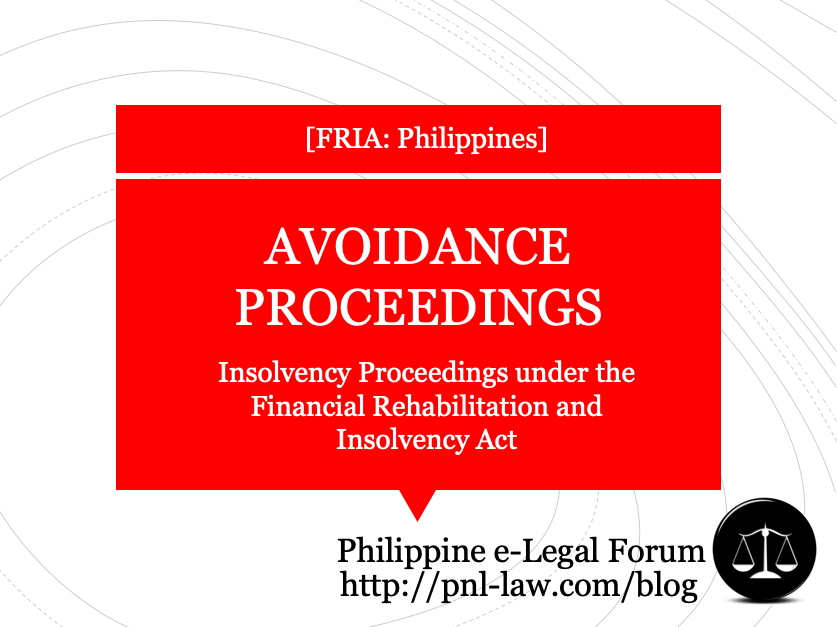Insolvency proceedings may refer to voluntary or involuntary proceedings for individual debtors (see Voluntary Liquidation Insolvency proceedings may refer to voluntary or involuntary proceedings for individual debtors(see Voluntary liquidation and Involuntary liquidation) or juridical entities (see Liquidation proceedings). The provisions on Liquidation Order are common in all these proceedings, as provided under Republic Act No. 10142, also known as the “Financial Rehabilitation and Insolvency Act (FRIA) of 2010“, and fleshed out in the FLSP Rules. For purposes of these common provisions, the term “debtor” includes individual debtors and other juridical debtors.

| Other Common Provisions: * The Liquidation Order * The Liquidator | * Determination of Claims * The Liquidation Plan * Secured creditors |
ACTIONS FOR RESCISSION OR NULLITY
(a) The liquidator or, with his conformity, a creditor, may initiate and prosecute any action to rescind, or declare null and void, any transaction described in the immediately preceding paragraph. If the liquidator does not consent to the filing or prosecution of such action, any creditor may seek leave of the court to commence and prosecute said action.
The court shall have 5 working days to act on the motion for leave to commence or prosecute an action.
(b) If leave of court is granted under subsection (a) hereof, the liquidator shall assign and transfer to the creditor all rights, title and interest in the chose in action or subject matter of the proceeding, including any document in support thereof.
(c) Any benefit derived from a proceeding taken pursuant to subsection (a) hereof shall belong exclusively to the creditor instituting the proceeding to the extent of his claim and the costs, and the surplus, if any, shall belong to the estate.
(d) Where, before an order is made under subsection (a) hereof, the liquidator signifies to the court his readiness to institute the proceeding for the benefit of the creditors, the order shall fix the time within which he shall do so and, in that case the benefit derived from the proceedings, if instituted within the time limits so fixed, shall belong to the estate.
In any case, the liquidator shall make provisions for any action for rescission or nullity in the Liquidation Plan.
RESCISSION OR NULLITY OF CERTAIN TRANSACTIONS
Any transaction occurring prior to the issuance of the Liquidation Order or, in the case of conversion of rehabilitation proceedings to liquidation proceedings, prior to the commencement date, entered into by the debtor or involving its assets, may be rescinded or declared null and void on the ground that the same was executed with intent to defraud a creditor or creditors or constitutes an undue preference of creditors.
- Extension of Filing Periods and Suspension of Hearings for March 29 to April 4, 2021: SC Administrative Circular No. 14-2021 (Full Text) - March 28, 2021
- ECQ Bubble for NCR, Bulacan, Cavite, Laguna and Rizal: Resolution No. 106-A (Full Text) - March 27, 2021
- Guidelines on the Administration of COVID-19 Vaccines in the Workplaces (Labor Advisory No. 3) - March 12, 2021
